Gounod: Roméo et Juliette
Introduction
There cannot be many stories which have grabbed the attention of artists of all kinds than that of the 'star cosss'd lovers'.
Shakespeare's take on the tale, however, has been the one which has had most influence, despite the fact that he himself 'borrowed' the story from an earlier Italian story. Several great operas, ballets and films have been created from the Bard's work, and not all ending tragically, as in the case of Georg Benda's own opera of 1776.
Gounod, despite leaving out some parts of the play (which is always necessary for ensuring a satisfactory length), keeps in everything important, allowing the audience to follow the main developments up to the inevitable tragic ending.
This particularly romantic score is one of the highlights of nineteenth century operatic writing, and has, despite accusations of being too sickly-sweet in parts, remained a favourite, and judging by the performance on this DVD, deservedly so.
Recorded over two nights in November 2004, it is one of the gems in the Royal Opera archives, including a relatively young Roberto Alagna in one of his favourite roles, and some sterling support from several great British singers.
Video
A very fine NTSC transfer, which is as clear as you would like, despite the near-darkness in which much of the stage is kept. Bright colours (where they appear) are conveyed natually, and there is no hint of pixellation. Close-ups are well handled, and show up some wonderful expressions from many of the cast, and a fairly severe shaving rash on the part of Alagna.
Audio
An excellent digital stereo sound with great balance and a satisfying dynamic range. Perhaps a slight shrillness to some of the upper registers, but this generally came about with Leontina Vaduva's top notes (and there are many examples of those!).
Extras
None, apart from a couple of sides of printed synopsis in the accompanying booklet.
Conclusion
There's nothing like inevitable and tragic deaths, especially those of young people (and better if they are in love) to get the juices of the great Romantic artists flowing.
First performed in 1867 (the same year as Verdi's Don Carlo, and indeed Arthur Sullivan's first operatta - which is irrelevant, but I like to keep things in perspective), Gounod's music grabs the attention in much the same way as Puccini would many years later, and to be honest, I'm amazed at how much of this music sounds as if it came from the pen of that most sentimental of Italian composers.
Wonderfully dramatic, with some decent characterisations and great melodic outpourings, make this one of Gounod's most touching works, yet it makes demands of everyone involved, not least the listener. Sometimes, you can have too much of a good thing, and just like many accuse Puccini of deliberately over-tugging the heart strings, the same can be said about this music.
With Charles Mackerras (who obviously has a great fondness for this work) at the helm, and the ROH orchestra on their best form, the music acquires a depth and emotion which raises it above the cheesiness often attributed to it.
It also helps having such fine singing from all the cast - something you can't often say.
Leontina Vaduva (Juliette), is a fresh and vivacious actress despite not exactly looking like a fresh and vivacious young girl. Her voice is spectacular, and becomes more 'womanly' as the story progresses. A vocal part like this is frighteningly difficult, and can only be completely convincing when someone is in their prime, as Vaduva obviously is. Nothing is wasted here.
Roberto Alagna (Romeo) is also at his vocal peak, almost making it sound easy. The unfortunate thing is that his acting, what there is of it, is absolutely atrocious. There appears to be little or no emotion in his face. Rather, he spends much of his time with his eyes shut, or just not paying attention to Vaduva at all, which is a bit off at the best of times, and just plain rude in the love duets.
A more cynical reviewer may think that he was only interested his own performance (vocally, at least). A little more attention to his fellow cast members would have been a bonus, but this mild streak of 'narcissism' actually spoils the death scene, which should be far more involving than it actually is.
The 'minor' cast members impress greatly, especially François le Roux (Mercutio) and Paul Charles Clarke (Tybalt), who actually manage to extract some sympathy from the viewer, despite the fact that it is they who are the catalysts for the tragic ending. Alagna is no match for these two.
Robert Lloyd (Friar Lawrence), Sarah Walker (Gertrude) and David Wilson-Johnson (the Duke), all give well-rounded performances. Wilson-Johnson in particular showing great nobility in his relatively small role, and Lloyd's sonorous bass sounds as good as ever (and despite the tonsure, he still has considerably more hair than when I last saw him in Aida).
So, a definite plus for the performances, and for breathing new life into what is often turned into emotional musical candyfloss. A minus for no extras and Alagna's acting, but only the acting, as vocally, this is one of the finest DVDs from the archives, and one which needs to be experienced.
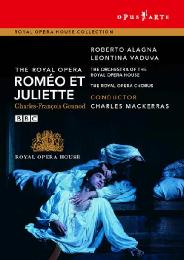
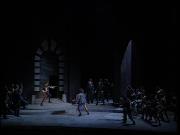
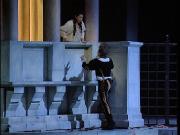
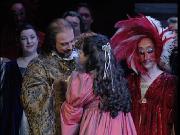
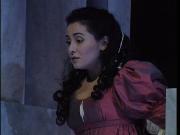
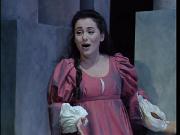
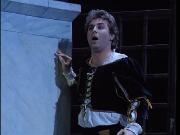
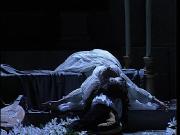
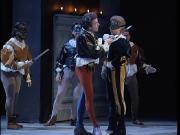
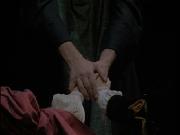
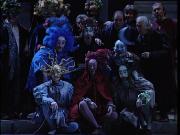


































Your Opinions and Comments
Be the first to post a comment!